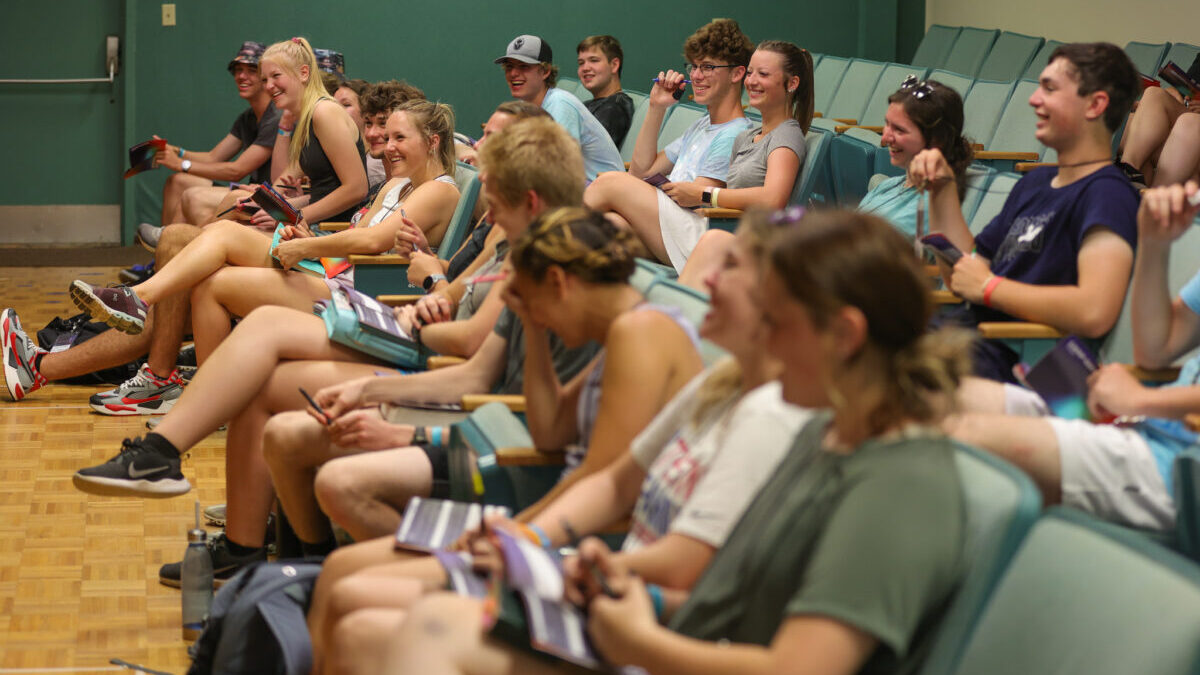Camp is a mountain top experience, a real spiritual marker in the lives of many campers who attend. Here’s what group leaders and campers have to say about the impact of camp:
“Our group had an unchurched student who didn’t even own a Bible attend camp. He accepted Christ this week. Our group is more unified than ever.”
“God has shown me the importance of service and putting feet to my faith.”
“God showed me it’s OK to be who I am.”
“During my week of camp, my leader taught me how to trust in the Lord and stay faithful.”
“At camp, I got to paint houses with my friends and got closer to God.”
I worked five summers of FUGE Camps and went on to devote my career for 23 years to this ministry because I am passionate about camp ministry and what the Lord does in the lives of campers when they get out of their comfort zones and turn their attention to Him.
Why camp matters to kids, teenagers and parents
Here are five reasons parents should send their children to camp and why kids and teenagers should want to be part of this experience.
1. Encounter God in a personal way
Summer camp can often be a spiritually life-changing event for kids and teenagers. They experience God either for the first time or in new and different ways through Bible study, worship and many other activities. This encounter becomes a spiritual marker in their lives. A change of routine, being away from home and distractions, and having unfamiliar, godly people speak into their lives creates a unique opportunity for campers to learn and grow in their faith.
2. Build relationships
While students are at camp, away from their norm, they have the opportunity to get to know each other and their leaders better as well as to make new friends from other church groups. They may even make friends for life. They also interact with staffers who are positive role models, speaking truth into their lives and ministering to them through intentional conversations. These God-centered relationships can have a lasting impact on a child’s faith. And, perhaps most importantly, kids and students build on their relationship with God at camp.
3. Be physically active and have fun
Camp schedules are usually packed with fun activities. Campers have activities to do and places to go from breakfast to bedtime. There is no chance for boredom. Camp gives them alternatives to technology and pushes them to be physically active doing activities they enjoy.
4. Develop life-long skills
The camp setting provides a safe opportunity for children and teens to test the waters of new experiences with a lessened fear of failure or rejection. They participate in new and diverse learning experiences that help them discover new talents. Camp is irreplaceable when it comes to learning and developing social skills, as well.
5. Grow more independent
Many students are away from mom and dad for the very first time when they go to camp. While under the close care and supervision of trusted adults, they begin to learn responsibility. They become more resourceful and must navigate situations independently. This aids in their growing up and maturation.
Why camp matters to the church and senior pastors
Here are five reasons you and your church should clear the path for kids and teenagers to attend camp.
1. An investment in the future
A church’s willingness to send kids and teenagers to camp is a good indicator of its investment in its future church leaders and is critical to their spiritual development. Teenagers and kids of today are the church leaders of tomorrow.
According to a 2019 Lifeway Research study, 2 in 3 (66%) American young adults who attended a Protestant church regularly for at least a year as a teenager say they also dropped out for at least a year between the ages of 18 and 22. Camp attendance throughout adolescence and teen years helps campers continue to grow spiritually and serve so they do not fall away from the church once they graduate high school.
2. Resources for today
The lessons and skills students and kids learn at camp can be used when they get back home to make a difference in your church and community. One of the goals of camp is to equip campers to do ministry at home.
This is especially true with mission camps. Students learn they can visit a nursing home in their own city — not just at camp. Students may grow in leadership skills, discover their spiritual gifts, or find their passion for worship and creative ministries — all of which can be used to serve in their churches when they get back home.
3. Discipleship time
The amount of discipleship time at one session of camp is more time than most leaders will have with their kids or teenagers for an entire year.
Most regular church attenders are at church twice a month for an hour each time. Campers experience Bible study and worship plus have time to form deeper relationships with leaders on the bus and during free time. This sets leaders up for deeper discipleship in the fall after camp.
4. Time back
Planning your own camp requires significant time, energy, creativity and people. This includes steps such as finding a camp location, writing Bible study curriculum, preparing production elements, planning recreation activities and hiring speakers and bands.
The list of necessary steps to pull off camp could go on and on. This requires your team to be experts at something in which they may not have experience. It takes away their time with students or kids at camp. And for those involved in the planning, it takes away from their own families. Attending a camp that is already planned and prepared takes significantly less time. That time can then be invested planning regular events, building relationships with students, and studying and preparing to teach and lead.
5. Building relationships
Camp is not a vacation for children and students or for youth pastors and volunteers. They may lead Bible study and church group time. They eat meals with campers. They spend free time with campers. They make sure campers are in bed on time and up and ready in the mornings. At camp, leaders encounter many opportunities for great conversations, fun and building relationships with kids and teenagers.
Next steps
Summer camps foster spiritual growth, personal growth and relationships in ways that are unlike any other traditional setting tailored for students. Now that you see the incredible benefits of camp, here are some next steps:
— Work with your kids pastor and student pastor to approve the trip to camp.
— As a church, provide financial support by making it part of the budget and having sponsor fundraisers.
— Encourage parents to support the decision to go to camp by sending their children.
— Clear any barriers that may try to prevent your groups from going to camp.
Learn more about Lifeway camps at lifeway.com/camps.
EDITOR’S NOTE — This story was written by Kyle Cravens and originally published by Lifeway Christian Resources.








